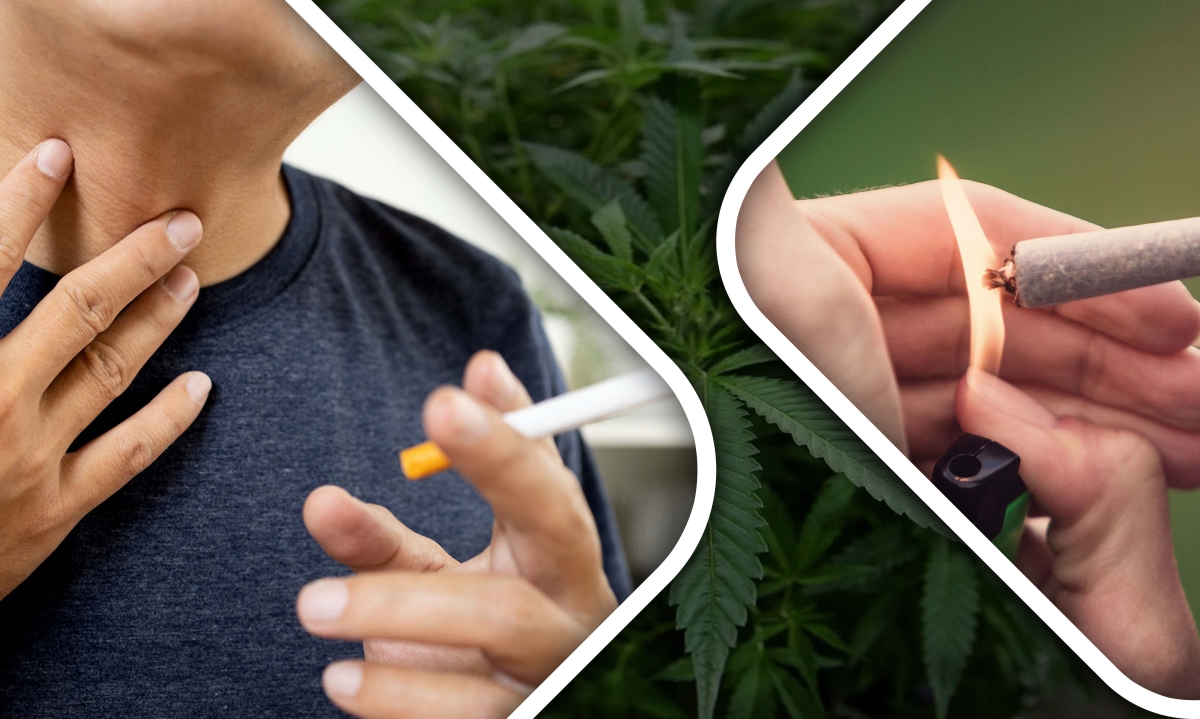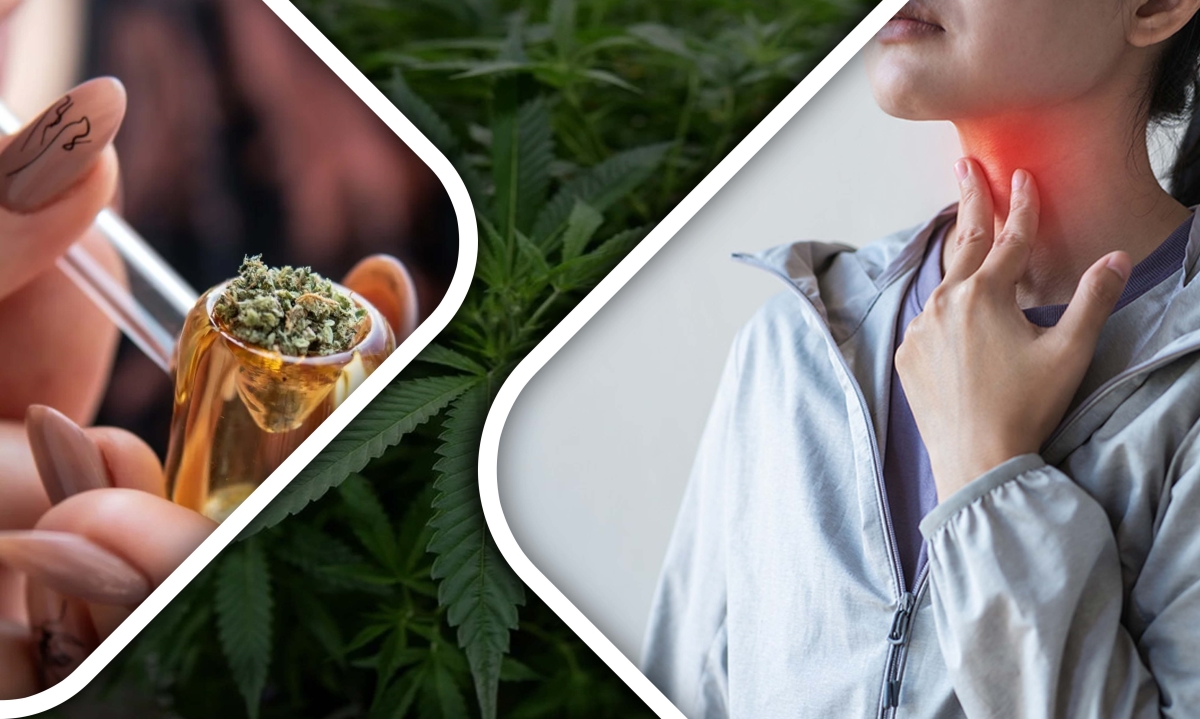Many people frequently have sore throat from smoking, which raises concerns about their cause. A common misconception among smokers is that smoking causes sore throats, especially if they use cannabis. This article clarifies misconceptions and provides suggestions for successful treatment as it examines the connection between smoking and sore throats.
Table of Contents
Does Smoking Cause Sore Throat?
Causes Of Sore Throat When Consuming Cannabis
1. Temperature of Smoke
2. Inhalation Technique
3. Chemical Composition
4. Frequency and Duration of Use
Exploring Alternatives Healthy Ways to Consume Cannabis
1. Vaporization (Vaping)
2. Edibles
3. Tinctures and Oils
4. Topicals
Preventing Sore Throat
Conclusion
FAQs
Does Smoking Cause Sore Throat?
One of the most common misunderstandings about marijuana is the belief that smoking, especially cannabis, harms your throat. There is more to the relationship between smoking and throat irritation than meets the eye. Smoking can irritate the throat, resulting in pain and inflammation. Smoking can irritate the sensitive tissues in the throat due to the inhalation of hot smoke and other substances.
The soft tissues in the throat are sensitive to heat and foreign objects and come into contact with smoke when inhaled. This may cause inflammation immediately, which would show up as an itchy or irritated throat. Moreover, tar and other particulate matter, among other elements found in smoke, can worsen this discomfort.
Inhaling cannabis smoke deeply and holding it in the lungs for a prolonged time can lead to increased irritation. However, it’s essential to note that any discomfort experienced from smoking is temporary and typically fades once exposure ceases.
Causes Of Sore Throat When Consuming Cannabis
People who use cannabis get sore throats, which begs the question of what causes them. Even though using cannabis is linked to therapeutic benefits, getting a sore throat might ruin the experience altogether. For efficient management and well-informed decision-making, it is essential to look into factors causing sore throats during cannabis use. In this article, we explore the different factors that cannabis users may have sore throats, offering insights on possible remedies and preventative steps.
1. Temperature of Smoke
The temperature of the smoke from cannabis is a major element that might cause sore throats when used. Smoke that is too hot to breathe in might irritate the throat’s fragile tissues, causing discomfort and irritation. Smoking cannabis at high temperatures raises the risk of discomfort in the throat. For those who experience sore throats after taking cannabis, it may be helpful to lower the temperature at which it is taken. Reducing the temperature of the smoke through cooling devices or vaporization techniques can assist minimize irritation to the throat.
2. Inhalation Technique
The way that a sore throat develops is also influenced by how cannabis is consumed. Taking in smoke with force or aggression can make it more irritating to the throat, especially if the smoke is taken into the throat. To lessen the strain on their throats, people who feel sore throats after consuming cannabis might want to think about changing the way they inhale. The discomfort can be reduced by taking slow, deep breaths and letting the smoke cool before it reaches the throat.
3. Chemical Composition
Cannabis can have a very different chemical makeup based on several variables, including strain, growing conditions, and extraction procedures. Terpenes and cannabinoids—two components found in cannabis—may irritate a person’s throat when they’re sensitive. For instance, large concentrations of some terpenes, such as Myrcene or Limonene, may have irritating qualities that make sore throats worse.
Furthermore, the throat can become even more irritated by toxins or pollutants found in cannabis products. Choosing premium, purified cannabis products will help lower the chance of sore throats brought on by the chemical makeup.
4. Frequency and Duration of Use
The chance of getting a sore throat can also be influenced by the frequency and duration of cannabis consumption. People who use cannabis regularly or in high doses might be more prone to irritation of the throat as a result of extended exposure to smoke or vapor. Prolonged use of cannabis can also have long-term impacts on the health of the throat, raising the possibility of discomfort and inflammation. The frequency and amount of cannabis usage should be moderated, and regular pauses should be included to assist lower the occurrence of sore throats.
Exploring Alternatives Healthy Ways to Consume Cannabis
People are looking for different ways to consume cannabis that provide the advantages of the plant without the negative effects of smoke inhalation as awareness of the possible problems linked with sore throat after smoking rises. Luckily, there are several different alternatives available, each with special benefits.
1. Vaporization (Vaping)
The process of vaping entails heating cannabis flowers or concentrates to a temperature that causes the vapor to release terpenes and cannabinoids without burning. By using this technique, you can smoke without the chemicals and irritants that come with smoke, making it a healthier option than regular smoking. Vaporizers are available in a variety of styles to suit a range of tastes and usage habits, including desktop models and portable ones. Vaporization also makes it possible to precisely adjust the temperature, allowing users to control their experience and maximize the absorption of cannabis.
2. Edibles
Gummies, chocolates, baked goods, drinks, and other snacks and drinks infused with cannabis fall under the category of edibles. Oral use of marijuana reduces the need for inhaling entirely and provides a discreet and simple route of intake. Since edibles require digestion before cannabinoids enter the body, the effects usually take longer for effects to appear than those of smoking or vaping. Taking edibles is an appealing option for long-lasting relief and therapeutic advantages because, once taken in, the effects are often stronger and more effective.
3. Tinctures and Oils
Tinctures and oils made from cannabis flowers or concentrates are liquid extracts that are combined with a carrier oil, like olive or coconut oil. By using a dropper to put these drugs through the mouth, or under the tongue, they can enter into the body. Tinctures and oils can be and provided since oral intake provides an immediate and more consistent amount than edibles. The benefits of cannabis can also be obtained without smoking or inhaling thanks to the ease with which tinctures and oils can be added to daily activities.
4. Topicals
Topicals made of cannabis are goods that have been infused with cannabinoids and used in the body to relieve pain, inflammation, and other conditions immediately. Cannabis topicals are available as creams, lotions, balms, and patches for the skin. Topicals are a good option for people who want therapeutic advantages without getting intoxicated because, in comparison to other routes of ingestion, they work without having a psychoactive effect. Topicals provide focused pain relief and are especially useful for treating targeted discomfort, swelling, and inflammation brought on by a variety of ailments.
Preventing Sore Throat
Smoking or other factors may not be the cause of a sore throat, but the following measures might help reduce discomfort while promoting healing:
Hydration: Drink plenty of water to keep your throat moist and help soothe irritation.
Practice Good Oral Hygiene: Gargling with warm salt water can reduce inflammation and provide temporary relief. Brushing your teeth, tongue, and gums regularly can help remove irritants and bacteria that may exacerbate throat soreness.
Throat Lozenges: Sucking on throat lozenges or using throat sprays can help numb the pain and ease discomfort. Thus, over-the-counter lozenges or throat sprays containing soothing ingredients like menthol or honey can provide temporary relief from soreness.
Humidifier: Using a humidifier in the room can add moisture to the air, preventing further drying of the throat. Adding moisture to the air with a humidifier can help reduce dryness and irritation in the throat.
Rest and Avoidance of Irritants: Resting the voice and avoiding further exposure to smoke or other irritants can aid in recovery. Continued smoking will only worsen symptoms and prolong recovery time.
Conclusion
Even though smoking—including consuming cannabis—can result in sore throats, it’s crucial to understand the complexity of throat irritation. If chronic exposure to these compounds is not addressed, it can result in chronic throat problems, irritation, and inflammation. To improve your health and well-being, it’s critical to take care of your throat if you’re suffering sore throat after smoking weed. You should also think about cutting back on your smoking or giving it up completely. Also, a broad strategy including other aspects is necessary, rather than attributing all suffering to smoking alone. By taking preventative action and being aware of the link between smoking and sore throats, people can lessen discomfort and maintain optimal throat health.
FAQs
1. Why does my throat hurt after smoking?
Answer: Ease your throat discomfort by using cough drops, lozenges, or engaging in a saltwater gargle. Ensure adequate hydration by consuming 6–8 glasses of water daily to maintain thin mucus in your lungs and throat. Elevate your head while sleeping to prevent mucus accumulation in your throat. Incorporate 30 minutes of daily exercise into your routine for consistent health benefits.
2. How long does it take for a sore throat to go away from smoking?
Answer: The most intense physical symptoms of withdrawal, like a sore throat, often occur right after quitting. For most individuals, these symptoms reach their peak around the second or third day after quitting. However, they tend to lessen in severity over time and disappear within a month.
3. Can too much smoke cause a sore throat?
Answer: Even individuals in good health may notice the impact of smoky air. They might encounter respiratory issues like coughing, wheezing, difficulty breathing, or a scratchy throat due to wildfire smoke. Additional signs might encompass irritated eyes, nasal congestion, fatigue, or headaches.
4. How do you tell if your throat is damaged from smoking?
Answer: Coughing, difficulty breathing, acid reflux, throat dryness, irritation, altered taste perception, halitosis, dental pain, congestion, olfactory disturbances, snoring, and nasal drainage were more prevalent in the group of individuals who smoked when contrasted with those who did not smoke.
5. How long does the smoker flu last?
Answer: Although nicotine withdrawal usually resolves, the cessation-related flu may persist for a period ranging from one week to a month. The length and severity of these indications can influence your success in quitting smoking.






